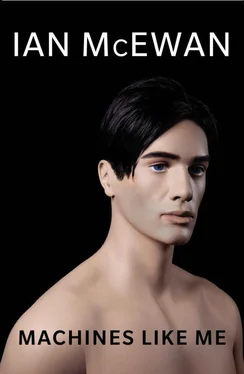We weren’t old enough, Miranda and I, to understand fully that a man in his late fifties was still too young to expect or deserve such multiple insults. But his resemblance to Job tortured by his pitiless God made it seem blasphemous to do anything but listen to Miranda. The night after my encounter in the playground stood out. Hard to believe of a man in love, but my mind wandered as she talked about him. She was just back from Salisbury, describing a fresh torment as we lay in bed. Sympathetically, I took her hand as she talked. The constant sufferings of a man I had never met could only hold me so long. Half listening, I was free to contemplate my life’s strange new turns.
Downstairs, still on the same hard wooden chair, my interesting toy waited under its blanket, its merged personality installed that afternoon while it slept. The adventure was about to begin. At my side was my future, I was sure of it. The imbalance in our feelings for each other would be righted. We were simply the embodiment of a pattern in modern manners: acquaintance, followed by sex, then friendship, finally love. There was no good reason we should travel this conventional course at the same speed. Patience was all.
Meanwhile, surrounding my islet of hopes was an ocean of national sorrow. With ghastly timing, the junta had raised that day 406 Argentine flags in Port Stanley, one for each of their dead, and staged a military parade along the deserted, sodden main street, while in London, in St Paul’s, a commemoration service was held for our 3,000. I watched it on television after I returned from the Common. There could hardly have been two dozen in that vast congregation of the ruling elite who thought that a God who preferred fascism to the Union Jack was worth the candle; or that the departed reposed in eternal bliss. But secular tradition couldn’t provide such familiar verses polished to a gleam by the long-discarded sincerity of previous generations. Man that is born of woman hath but a short time to live . So the hymns were sung, the impenetrable, echoing readings intoned, the responses returned in ragged unison, while the rest of us mourned at the altars of our TV sets. Unlike Miranda, I mourned too.
With a million and a half others I had ‘marched’ through central London to protest against the Task Force. In fact, we crept along, stopping to wait at many bottlenecks. The usual paradox held: the matter was grave, the demonstration joyous. Rock bands, jazz bands, drums and trumpets, witty banners, wild costumes, circus skills, speeches, and above all the exhilaration of such numbers, taking hours to file past, so diverse, so clearly decent. So easy to believe that the whole nation had invaded London to make the obvious point that the coming war was unjust, inhumane, illogical, potentially catastrophic. We couldn’t know just how right we were. Or how effectively Parliament, the tabloids, the military and two-thirds of the nation would dismiss us. It was said we were unpatriotic, defending a fascist regime and opposing the rule of international law.
Where was Miranda that day? We barely knew each other then. She was in the library, making the final changes to her half-wild pigs paper. She had unusual ideas about the Task Force for someone in her twenties, and she distrusted the spirit of what she called a ‘self-loving crowd’, its easy like-mindedness, its stupid high spirits. She didn’t share my aptitude for protest or sentiment. She was not interested in watching the ships leave, or in what came to be known as The Sinking, or the inglorious return and still less the service in St Paul’s. Where I had talked with friends about nothing else for months and read every opinion on the affair, Miranda stayed away. When the ships sank, she was silent. When the black ribbons appeared, she wore one, but she wouldn’t be drawn. As she put it, the whole episode ‘stank’.
Now, as I lay beside her with her hand in mine, the orange street lights beyond the curtains gave her bedroom the appearance of a stage set. She had taken the last train home and waited for a delayed Tube to Clapham North. It was almost three o’clock. She was describing how Maxfield had told her ruefully that the gout in his thumbs was a blessing. The pain was so ferocious and localised that his other complaints had faded.
I was still holding her hand. I said, ‘You know how much I want to meet him. Let me come with you next time.’
Several seconds passed before she drowsily replied. ‘I’d like to go very soon.’
‘Good.’
Then, after another pause, ‘Adam must come too.’
She stroked my forearm in a gesture of farewell as she turned on her side, away from me. Soon her breathing was regular and deep, and I was left pondering in the monochrome sodium dusk. He’s coming too. She had assumed joint ownership, just as I’d hoped. But an encounter between Adam and an old-style literary curmudgeon like Maxfield Blacke was hard to envisage. I knew from the profile that he still worked in longhand, detested computers, mobile phones, the Internet and all the rest. Apparently, he didn’t, in that priggish cliché, ‘suffer fools gladly’. Or robots. Adam had yet to be woken. He had yet to leave the house, yet to test his luck as a plausible being capable of small talk. I’d already decided to keep him away from my circle of friends until he was a fully adept social creature. Starting out with Maxfield could disable important sub-routines. Miranda might have been hoping to distract her father and energise his writing. Or it was to do with me, somehow in my interests in ways I didn’t understand. Or – I failed to resist this thought – against them?
That was a bad idea, of the kind that comes in the small hours. Like all insomniac brooding, the essence was repetition. Why should I meet her father in the presence of Adam? Of course, it was entirely in my power to insist on keeping him here. But I would be denying the wishes of a woman whose father lay dying. Was he really dying? Was it possible to get gout in your thumb? Bilaterally? Did I really know Miranda? I lay on my side, seeking a cool corner of the pillow, then on my back with a view of a dappled ceiling that now seemed too close, and yellow rather than orange. I asked myself the same questions, I rephrased them and asked them again. I knew what I was about to do, but I delayed, preferring to fret, denying the obvious for almost an hour. Then at last I got up, pulled on my jeans and t-shirt, let myself out and went barefoot down the communal stairs to my own flat.
In the kitchen I didn’t even pause before pulling the blanket clear. Outwardly nothing had changed – eyes closed, that same bronze face, the nose with its hint of cruelty. I reached behind his head, found the spot and pressed. While he was warming up I ate a bowl of cereal.
Just as I was finishing he said, ‘Never be disappointed.’
‘What was that?’
‘I was saying that those who believe in the afterlife will never be disappointed.’
‘You mean, if they’re wrong they’ll never know about it.’
‘Yes.’
I looked at him closely. Was he different now? He had an expectant look. ‘Logical enough. But Adam. I hope you don’t think that’s profound.’
He didn’t reply. I took my empty bowl to the sink and made myself tea. I sat at the table, across from him, and after taking a couple of sips, I said, ‘Why did you say that I shouldn’t trust Miranda?’
‘Oh that…’
‘Come on.’
‘I spoke out of turn and I’m truly sorry.’
‘Answer the question.’
His voice had changed. It was firmer, more expressive in its varied pitch. But the attitude – I needed more time. My immediate, unreliable impression was of an intact presence.
‘I was thinking only of your best interests.’
‘You just said you were sorry.’
Читать дальше










![Иэн Макьюэн - Таракан [litres]](/books/435106/ien-makyuen-tarakan-litres-thumb.webp)

